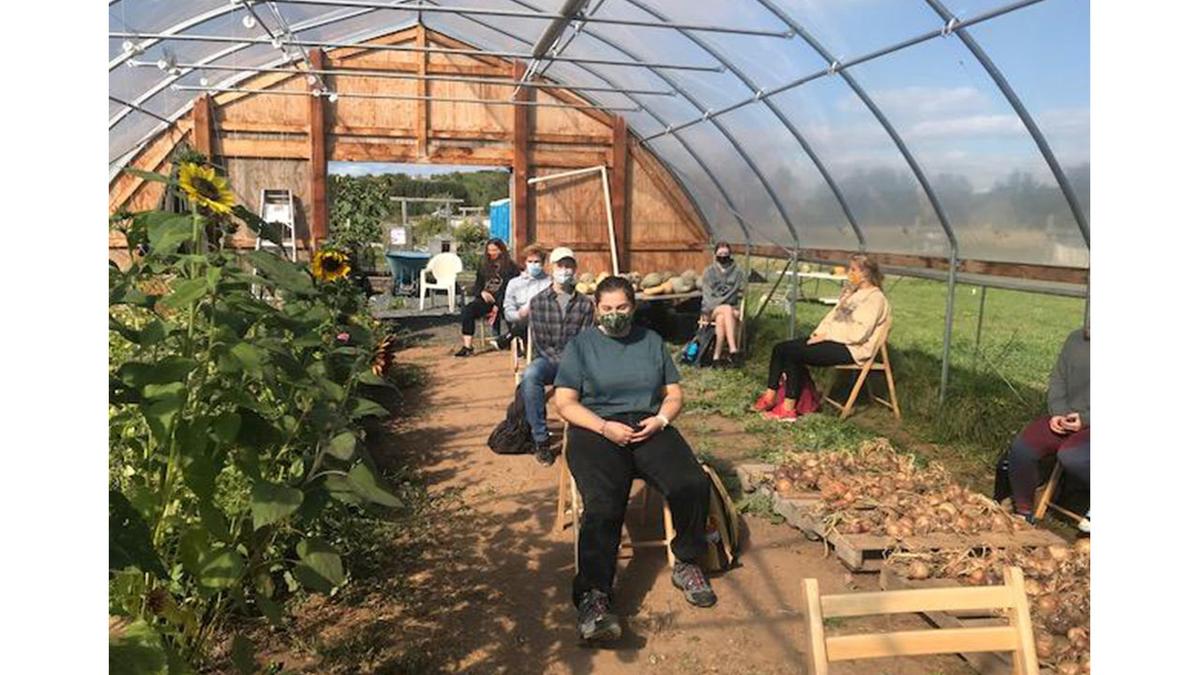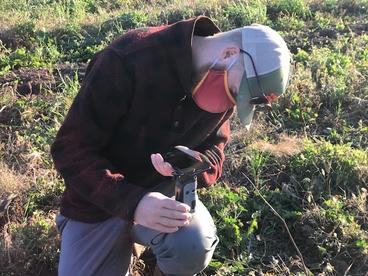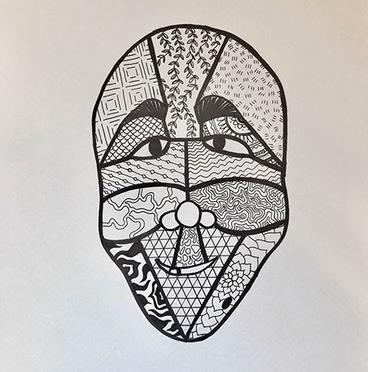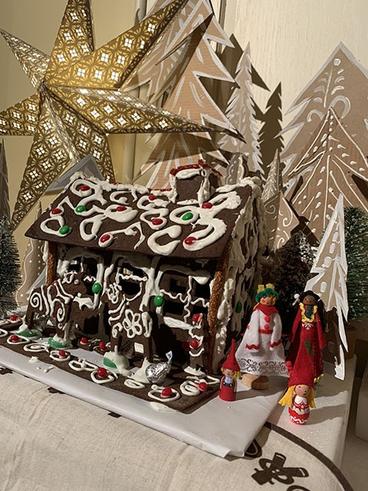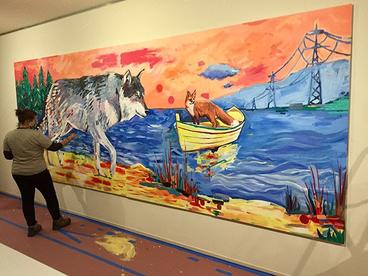Many faculty have created new forms of instruction in order to reach their students. Pre-recorded lectures, lab instructions, and activities have become the new norm, but this has allowed for more individualized assistance through unique and innovative participation and collaboration. Students have been able to utilize the small group setting more than ever before, where they work with a multitude of different students to complete academic assignments, receive feedback, and provide support to others. Through the use of new and interactive online class settings, students and faculty have been able to build stronger connections and enjoy the flexibility to engage with the curriculum at the level they chose. Here’s a sampling of several areas.
Laure Charleux, in the Department of Geography, has found a unique educational platform that allows further exploration than the typical Zoom experience. Her class utilizes the platform Discord, in order to create workshop-like classes which allow for more student flexibility within lessons. This platform allows the students to create their own private spaces, in which they can work together and provide feedback and assistance to their fellow peers and receive individualized feedback from the instructor. This has provided a sense of normalcy as interactions which would normally take place face-to-face can be recreated through this online platform.
The Geography department has utilized the adaptability of their students and lessons to provide truly unique educational experiences. Under the supervision of Teresa A. Bertossi, geography, environment, and sustainability students have been able to receive Covid friendly in-class instruction. Although facing adversity within the classroom, this has not stopped students and staff from reaching into their community to provide support and resources. Over the semester, students have taken part in numerous community outreach and collaboration activities, including a collaborative eco-friendly scarecrow competition with the Sustainability Office and the creation of a pumpkin compost drive which was open to the public.
Their utilization of the Land Lab has also significantly increased as it was used to provide food for the food desert project, Morgan Park, when food banks were unable to meet the demand. The Land Lab, along with the UMD farm, has allowed for safe exploration as UMD students continue to work on their UROPs and even opened the facility to a local Duluth high school student, who developed a beneficial insect garden during the pandemic.
In the Music department, Justin Rubin is encouraging students through similar strategies. The use of online learning platforms has allowed him and his students to share their compositions directly, in a space where students can work in real-time to experiment with their work. Overall, Rubin has recognized an increase in grades and attendance as a direct result of this unique online class design.
The Art and Design department has also been exploring new projects and activities during this time as well. Under the instruction of Eun-Kyung Suh, students are working to complete new research papers and projects exploring traditional masks from a variety of ethnic groups and countries. While exploring these new research assignments, the online setting has allowed for outside collaboration, as an artist was welcomed into the class with less restrictions than within the traditional classroom setting.
Although the academic semester looks different this fall, faculty, staff and students saw these unique circumstances as an opportunity to explore new teaching and learning strategies. This exploration has proven to not only benefit the UMD community, but the greater Duluth community as well.
Alison Aune, an educator in the Department of Art and Design, has embraced the Pepperkakebyen spirit as she continues to develop a sense of community during the Covid-19 pandemic. Working alongside her students, Aune helped to construct the Pepperkakebyen Gingerbread City at the Nordic Center, in downtown Duluth. Her students are also in the process of creating Pepperkakebyen inspired prints and hand printed cards to be sent to a local nursing home.
Her class has also successfully created Zoom inspired winter cultural craft workshops for children. These workshops are near to Aune’s heart as she has created weekly art making, story telling, and puppet crafting workshops for and with her four-year-old granddaughter over Zoom. Through these Zoom sessions, she explores a wide variety of artists, styles, and whimsical tales. Through her work, it is clear that art can always bring the community together, even if it’s not face-to-face.
Since the beginning of the pandemic, the Tweed Museum of Art has become an educational hub for the UMD community. Faculty have utilized this valuable resource in order to teach, develop topics, and utilize the Tweeds collections of art and resources. This has greatly benefited the classroom, where students across disciplines have collaborated with local artist Adam Swanson, studied collections, created student exhibitions, composed music inspired by the Tweed's collections, and enjoyed visits to the museum, as it remained open as one of the few places to safely engage with art and one another during COVID-19. The pandemic has also allowed the Tweed to develop more virtual content and collaborations between faculty and the community that can be displayed through their online events. Moving forward, the Tweed is hoping to film their new exhibitions, providing the community with new and exciting art to engage with in 2021.
As students in the Writing Club and in creative writing classes within the Department of English, Linguistics and Writing Studies experience the unique challenge of the shifting of their Annual Winter Reading to an online platform, they have been provided the opportunity to see their written works develop into artistic representations. To retain the excitement of the event, students had the opportunity to collaborate with the MMADLab in order to design digital illustrations and animations to accompany their writings. Although forced to adapt to Covid regulations, students are finding new and exciting ways to display their works, allowing the annual event to develop into an evening more creative than ever before.
The Opera Studio, within the Department of Music, has provided guests and actors with new experiences during the COVID-19 pandemic. Students explored new theatrical techniques and practices as they utilized masks to rehearse outdoors and developed their performance into a recorded opera experience with a completely new format. The Opera Studio was able to complete their performance through many collaborative efforts. Students individually recorded their audio tracks, which were then edited by Marcus McConico and engineered by Don Schraufnagel. Their collaborative efforts were also utilized throughout the filming process. From the opera, three scenes were filmed outdoors, directed by Alice Pierce. Another three scenes, filmed in Weber Music Hall, were directed by Rachel Inselman. The last scene was filmed, edited and recorded by the Studio’s own graduate student and her husband. The final production could not have been completed without the efforts of MMAD Lab videographer, Dan Fitzpatrick, whom they will continue a partnership with into the spring semester.
In this year’s production, students utilized unique COVID-19 friendly costumes. Students created their costumes from clothing in their own closets and utilized the Theatre Department for additional pieces, props, and furniture. They even used clear masks, used for the hearing impaired, as they lip-synched to their audio recordings. The finished product is an hour long virtual performance, which became available in late November.
Learn more about UMD's College of Liberal Arts.
